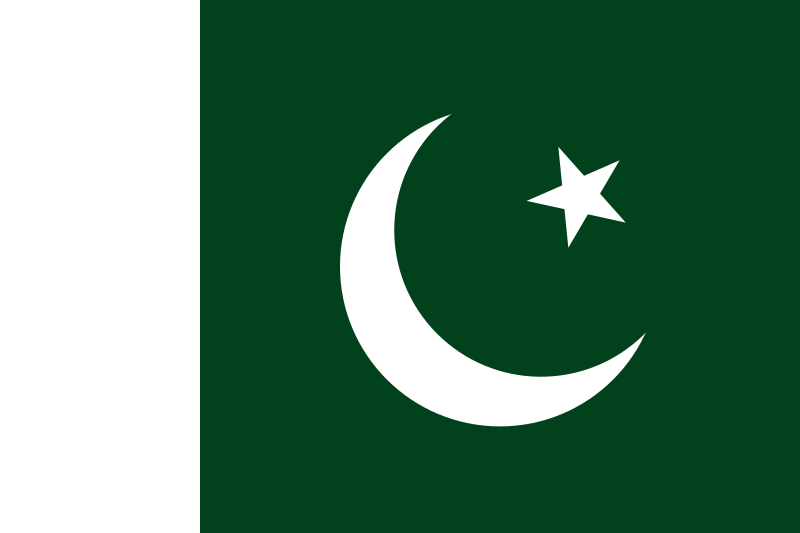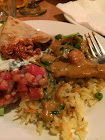There are over 70 shades of green. There is Army green, and Olive green, Bottle green, British racing car green, Chartreuse, Absinthe, Shamrock green, UFO green, even Zomp green, and then there is Pakistan Green. Pakistan Green is a distinctive dark green, as displayed on the national flag of The Islamic Republic of Pakistan. The green on the flag represents Islam and the Muslim majority in Pakistan, and has some very specific protocols: In Pakistan, no other flag may fly higher; it may never touch the ground, shoes or feet of anyone unclean; it may never be flown in darkness and may never be buried or lowered into a grave. The Flag must always be hoisted on the 14th of August to commemorate that day in 1947 when Pakistan was carved out from British India as a home to Indian Muslims and became a sovereign state.
With 180 million people, Pakistan is the 6th most populous country in the world, and the second largest Muslim nation, after Indonesia. I therefore found it quite surprising to learn that there are only 31,277 Pakistani's permanently living in Australia. They started to arrive in the late 1800's as cameleers, hawkers and labourers. Most arrived in the 1950's as camel drivers, when camels were the go-to mode of transport to conquer Australia's big red centre. Today, those who arrive on our shores are mostly temporary students (presently over 7,400 Pakistani's are studying in Australia on student visas).
Being a Muslim nation, it comes as no surprise that the Islamic faith forms the basis of Pakistani cuisine (no pork or alcohol). Pakistan is divided into 4 provinces, all with different regional specialities. The Indian Moghul Empire ruled the region for hundreds of years, permanently influencing the herb and spice profile of its cuisine - with saffron, almonds and raisins featuring prominently. Lamb and goat are the proteins of choice, with lentils and rice acting as staples. It is a cuisine rich with sauces and chutneys, pickles and preserves, giving Pakistani food its distinctive flavour.
The closest we could get to a Pakistani restaurant in Brisbane was The Sultan's Kitchen, which specialises in the food of the Indian Sub-Continent. The Sultan's Kitchen is situated a mere stone's throw form SunCorp Stadium. Unbeknown to me, there was a rugby league came on last night, when parking restrictions apply and football fans congest the pavements, fill the bars and invade the restaurants. I made a booking for 8 people a week ago, and when we arrived, a table of 8 burly Bronco supporters have taken our table. Hugely apologetic, the owner somehow managed to do some creative rearrangement to honour our booking (I think some diners were politely escorted out while still chewing...). After the initial hick-up, everything went smoothly. The food was delicious, the service friendly (though a bit stressed) and once the footy crowd departed for the game, we were the only people enjoying the splendours of the Sub-Continent. We started with 3 platters of The Sultan's Mix (samosas, onion pakoras and chicken tikka). For mains we all had a different dish: Lamb Rogan Josh, Dhal Masala, Fish Curry, Butter Chicken, Beef Nisha, Tandoori Chicken, Saagwala and a delicious eggplant curry. No doubt, in time, we shall return to the Sultan's Kitchen.
I love the fact-sharing part of the evening (see blog week 1 for FNO rules). I cannot quite remember all Kerry's facts, but I can clearly recall her whistle to capture our (and the rest of the restaurant's) attention for Phil's first fact: Alexander the Great fought his most costly battle on the border of (now) Pakistan 2,300 years ago. However, he did not retreat without leaving a legacy - The Kalash people, an ancient white ethnic group living in the Hindu Kush are considered to be the lost children the great man. Apart from the flag facts, Boetie also elaborated on the national animal, the Markhor, which is the most amazing large, wild goat, with horns that resemble that of a Kudu (see picture below). Keith showed us pictures of the Karakoram Highway that connects Pakistan with China - the world's highest international Rd which took 15 years to build. Martina had a couple of disturbing facts about Pakistan's non-compliance with the Nuclear Non-Proliferation Treaty (together with India and North -Korea), Nielen brought to our attention that in Pakistan a new baby is born every 7 seconds, and Anna informed us that the first PC virus was invented by two Pakistani's in the 1980's. We spoke about the most famous teenager in the world: MalalaYousafzai ( a young, heroic activist for education and woman's rights, who was shot through the head by the Taliban on her way home from school), and that Pakistan has only ever won one medal at the Olympic Games: a bronze for hockey in 1992.
Time to jump continents: next week we travel to The Horn of Africa. See you in Eritrea.
Markhor




 Pie and Pasty
Pie and Pasty Fish and chips
Fish and chips Restaurant to the right
Restaurant to the right Shop to the left
Shop to the left




